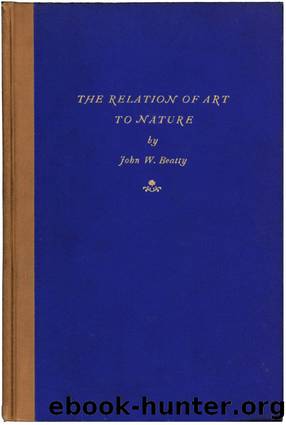The Relation of Art to Nature by John W. Beatty

Author:John W. Beatty [Beatty, John W.]
Language: eng
Format: epub
Published: 2016-11-07T16:00:00+00:00
âIf I had wished to modify what I saw and to make it more beautiful I should have produced nothing good.â
âThe only principle in Art is to copy what you see. Dealers in aesthetics to the contrary, every other method is fatal. There is no recipe for improving Nature.â
âThe only thing is to see.â
âThe ideal! The dream! Why, the realities of Nature surpass our most ambitious dreams.â
* * *
Opinions of Philosophers and Writers
The opinions here referred to are those of masters who have produced works of art. They seem to be supported by the opinions of able writers and philosophers who have dealt with this subject. If the opinions of these writers are less authoritative, they are nevertheless important as representing the thought of profound scholars. They cover practically the entire period of writing upon art. While diversified in the manner of approach, they will be found to unite in a common theory. These writers naturally deal with mental processes; with the attributes of the mind; with the philosophy of the subject.
Schopenhauer
Schopenhauer defines genius as pre-eminent capacity for contemplation which ends in the object. âNow,â he says, âas this requires that a man should entirely forget himself and the relations in which he stands, genius is simply complete objectivity, i.e., the objective tendency of the mind, as opposed to the subjective, which is directed to oneâs own selfâin other words, to the will. Thus genius is the faculty of continuing in the state of pure perception, of losing oneâs self in perception, and of enlisting in this service the knowledge which originally existed only for the service of the will; that is to say, genius is the power of leaving oneâs own interests, wishes, and aims entirely out of sight, and thus of entirely renouncing oneâs own personality for a time, so as to remain pure knowing subject, clear vision of the worldâand this not merely at moments, but for a sufficient length of time and with sufficient consciousness to enable one to reproduce by deliberate art what has thus been apprehended, and âto fix in lasting thoughts the wavering images that float before the mind.ââ
Schopenhauerâs definition of genius is probably more accurate and more logical than that of any other writer. In his opinion, genius is the power of pre-eminent perception. The artist only exceeds his fellows in that his perception is keener; that he is able to see and understand more perfectly than others. When an able painter approaches nature in this spirit, forgetting all else, as Schopenhauer suggests, the result is usually a masterpiece. To such a painter is attributed the quality known as genius.
Download
This site does not store any files on its server. We only index and link to content provided by other sites. Please contact the content providers to delete copyright contents if any and email us, we'll remove relevant links or contents immediately.
| Africa | Americas |
| Arctic & Antarctica | Asia |
| Australia & Oceania | Europe |
| Middle East | Russia |
| United States | World |
| Ancient Civilizations | Military |
| Historical Study & Educational Resources |
The Bomber Mafia by Malcolm Gladwell(1184)
Submerged Prehistory by Benjamin Jonathan; & Clive Bonsall & Catriona Pickard & Anders Fischer(1162)
Facing the Mountain by Daniel James Brown(1135)
The Dawn of Everything by David Graeber & David Wengrow(1112)
The Way of Fire and Ice: The Living Tradition of Norse Paganism by Ryan Smith(1033)
Wandering in Strange Lands by Morgan Jerkins(1019)
Driving While Brown: Sheriff Joe Arpaio Versus the Latino Resistance by Terry Greene Sterling & Jude Joffe-Block(1003)
Tip Top by Bill James(1002)
Evil Geniuses: The Unmaking of America: A Recent History by Kurt Andersen(1001)
Red Roulette : An Insider's Story of Wealth, Power, Corruption, and Vengeance in Today's China (9781982156176) by Shum Desmond(1000)
F*cking History by The Captain(969)
It Was All a Lie by Stuart Stevens;(942)
White House Inc. by Dan Alexander(907)
Evil Geniuses by Kurt Andersen(903)
Treasure Islands: Tax Havens and the Men who Stole the World by Nicholas Shaxson(880)
American Dreams by Unknown(860)
American Kompromat by Craig Unger(849)
The Fifteen Biggest Lies about the Economy: And Everything Else the Right Doesn't Want You to Know about Taxes, Jobs, and Corporate America by Joshua Holland(817)
The First Conspiracy by Brad Meltzer & Josh Mensch(813)
